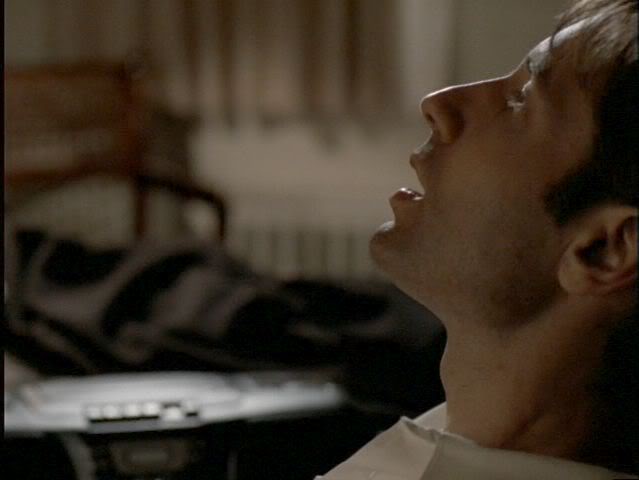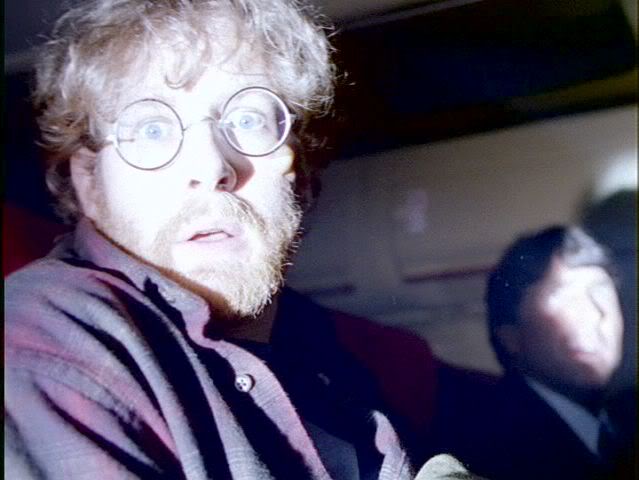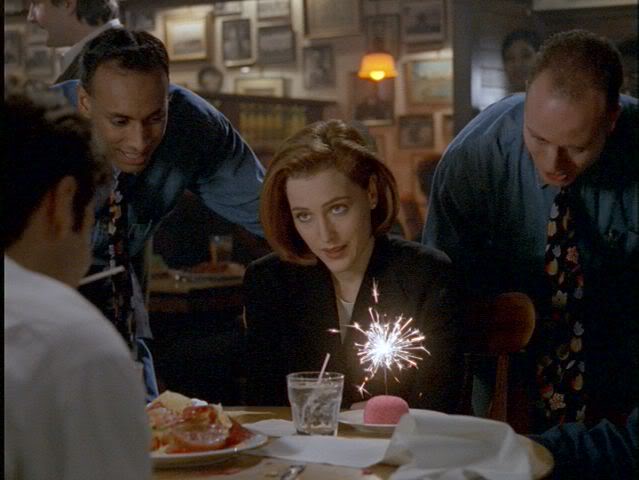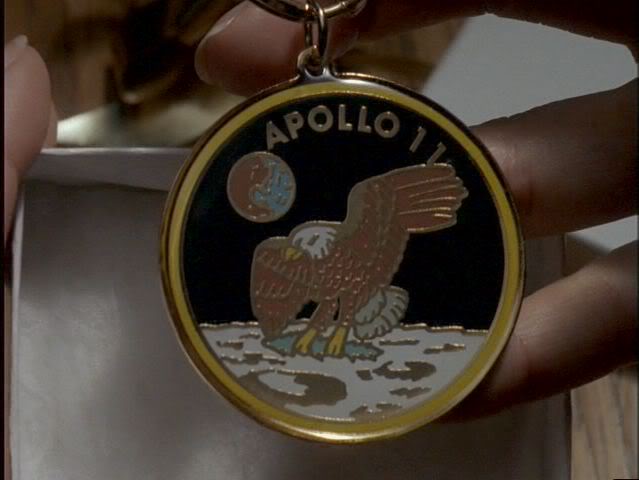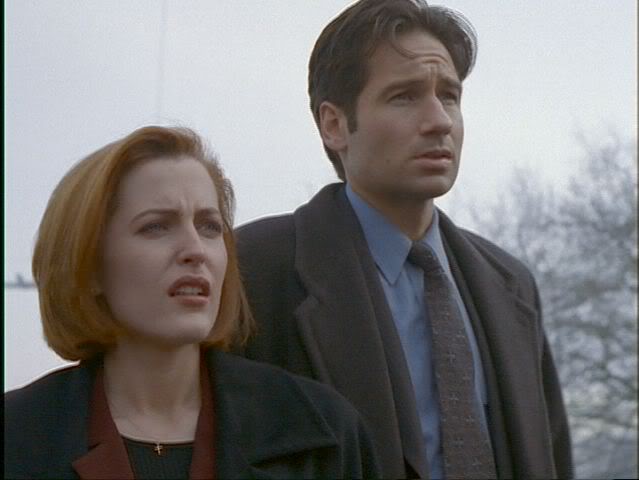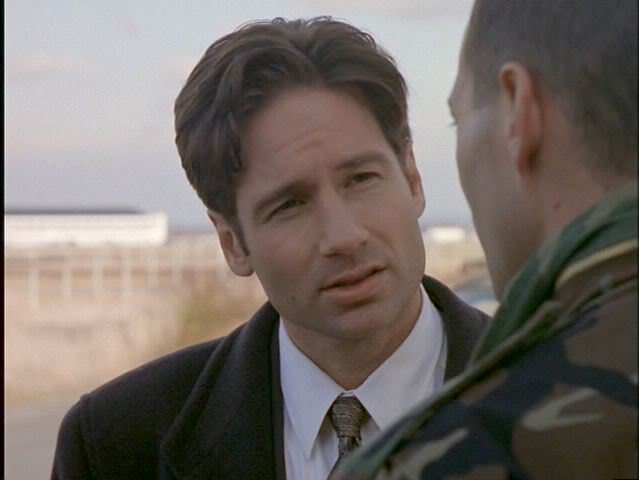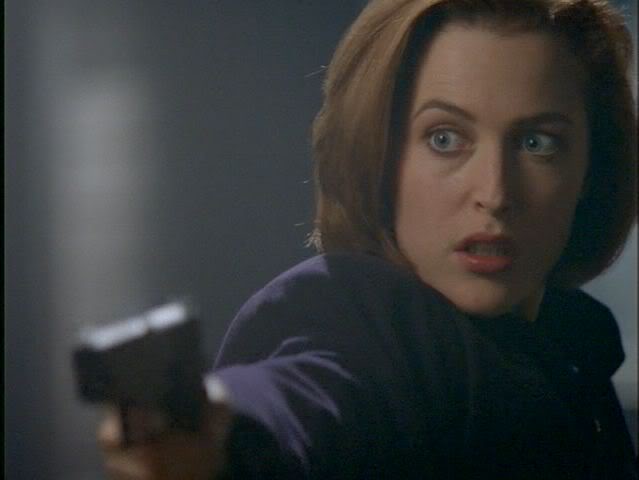CTP Episode of the Day - 07.11.06
Today's Cherished Episode: Tempus Fugit (4x17)
Original Air Date: March 16, 1997
Written By: Chris Carter and Frank Spotnitz
Directed By: Rob BowmanA former UFO abductee is killed in a catastrophic plane crash. Mulder suspects a conspiracy -- and a cover-up.
(Thanks to chrisnu for today's episode pics.)
"These men are trained to identify moving parts. Hydraulics, electronics. They're trained to reconstruct those parts and the past and arrive at the present. But they can't do that because somebody has stolen the past from them. Nine minutes of it. Nine minutes that became a lifetime for those passengers, and now for their families. Someone has got to figure out what happened in those nine minutes. Somehow, we've got to get them back."
Some "Tempus Fugit" Tidbits and Musings:
-- This episode was originally titled "Flight 549," then "Tempest Fugit" before finally being changed to "Tempus Fugit."
-- "Tempus Fugit" means "time flies" in Latin, but Frank Spotnitz noted the title is really a play on words since during the course of this two-part episode, there are two airplane flights when time disappears; and of course, lost time is a phenomenon associated with close encounters.
-- By virtue of Scully's birthday celebration, we know that this episode takes place sometime between February 23 and 26. (And Scully is celebrating her 33rd birthday.)
-- For a couple of years after "Fallen Angel," Scott Bellis auditioned for a small part as an FBI Agent on The X-Files. But no dice. Chris Carter said that people's memories of Bellis's Season 1 role were just too strong. In fact, Carter submitted Bellis for a guest actor Emmy nomination for his role as Max Fenig in "Fallen Angel."
-- Bellis specialized in playing gentle eccentrics or characters "where it's not really clear that the producers don't know what they're looking for"; and after "Fallen Angel" he kept running into David Duchovny at the gym. Duchovny provided encouraging conversations and Bellis heard enticing rumors that Fennig would eventually resurface. The rumors proved correct, and in November 1996, the producers notified Bellis's agent that they wanted him to guest star as Max in a two-part episode. Then, again true to form, they told him nothing more until February, approximately one week before "Tempus Fugit" was to begin filming.
-- Advance preparation for "Tempus Fugit" and "Max" began during the third season, when Chris Carter decided that a future episode would be centered around a Boeing 737 that rocked, shook violently, and ultimately crashed. "Beyond that," said Frank Spotnitz, "we didn't know what the story was." But the fact that there was no story wasn't deemed to be an especially important problem at the time. By the beginning of the fourth season, Chris Carter had the idea of bringing Max back in what was then known as "the plane crash episode." Spotnitz liked the idea because it would add to Mulder's emotional involvement in the crash to have someone he knew aboard. But Spotnitz didn't want to bring Max back and then milk his character or revisit something they had already done. So the decision was made to kill Max off immediately, so that by the first act viewers would know that Max was dead.
-- While one production team set about finding a camera-accessible plane interior that rocked and shook violently (more on that in tomorrow's discussion of "Max"), another team was concentrating on how to stage the plane crash. An investigation from the National Transportation Safety Board (NTSB) was brought in as a technical advisor. With the crash of TWA Flight 800 still fresh in everyone's mind, a piece of waste ground near Vancouver's Boundary Bay airport was singed with blowtorches and scattered with wreckage, luggage, small forensic flags, and "dead" bodies and body parts. The "crash scene" was about a ½ acre in total.
-- The largest piece of wreckage was a Boeing 707 tail section from an airplane junkyard in North Carolina. After Val Arntzen of the set-decorating department tracked it down, she ordered it loaded onto a truck, driven cross-country non-stop (it took five days and nights), and lowered onto the location for the few seconds of filming that would make it into the final cut.
-- Greensman Frank Haddad supervised the draping of dozens of pieces of victims' clothing -- and a severed hand, a brief shot of which was excised from "Tempus Fugit" by the network's Standards and Practices department -- onto newly planted leafless trees.
-- Art Director Gary Allen said that the plane crash site was the only location he had ever seen where the crew was actually disturbed by the scenery. Chris Carter thought this was a good thing, because "when you're in the business of creating scary stories, you know you're successful if it scares you too." The NTSB technical advisor told the crew that they had done an absolutely believable and authentic job of recreating everything consistent with a crash site except for one thing: the smell -- something you could never recreate, nor want to.
-- The red and yellow crime scene flags were also realistic indicators used in airline crashes. The small red flags were used to pinpoint the location of a body or other human remains, and the yellow flags were used to mark each scrap of wreckage found.
-- Production designer Graeme Murray remembered that in the early morning, viewing the "crash site" felt like you were watching a documentary about an airplane crash, with the bits of luggage and clothing up in the trees making the scene very realistic and scary. Since the site used was near the airport, there were lots of planes flying over the scene during filming, and many of the pilots radioed the airport to report a plane crash -- it was that realistic.
-- The UFO that shines its light down onto crash investigator Mike Millar was created in postproduction by visual effects supervisor Laurie Kallsen-George. The effects team added aerosol spray in front of the light to enhance its otherworldly quality.
-- By comparison, the underwater scenes -- filmed, as was the show's usual procedure, in the nearby indoor tank of a Vancouver-based diving equipment manufacturer called CanDive -- went smoothly. The brilliant light that shined down on Mulder near the underwater wreckage was actually a spotlight borrowed from a Canadian Coast Guard rescue helicopter. The light came complete with two Canadian Coast Guard helicopter crewmen, who operated it during the filming of the scene. "They were big fans of the show," said production manager George Chapman. "I think in their minds, at least, this assignment rated as a real adventure."
-- Character Larold Rebhun, the sole survivor of the crash, who sat next to Max and witnessed his abduction, shares his name (but not its pronunciation) with X-Files sound mix meister Larold Rebhun.
-- Assistant Director Vladimir (Val) Stefoff played the bartender at the Headless Woman Pub. Assistant location manager Ainslie Wiggs also played a party barfly, but was edited out of the final cut.
-- The pseudonym Max Fenig uses on his ill-fated flight is Paul Gidney. Gidney was the name of one of the Moon Men in the first adventure of "Rocky and His Friends" (1959 titled "Jet Fuel Formula" (the other Moon Man is Cloyd). Rocky's main friend was of course Bullwinkle, or Moose and Squirrel as they were otherwise known -- a nickname that also stuck to a couple of FBI agents we all know and love.
-- Joe Spano (Mike Millar) is best know for his role as Sergeant/Detective Henry Goldblume on the long-running police drama Hill Street Blues.
-- Other Once and Future Retreads: Chilton Crane (Sharon Graffia) had small roles in "F. Emasculata" and "Miracle Man." Rick Dobran (Sgt. Armando Gonzalez) appeared as a bartender in "Mind's Eye." Jerry Schram (Larold Rebhun) played Boyce in "Kill Switch." Marek Wiedman who played one of the investigators appeared in "The Pine Bluff Variant" as the bank manager. Robert Moloney (Bruce Bearfield - the guy on the boat with Mulder) was a chicken plant worker in "Our Town."
-- A birthday celebration with a Hostess Snowball and sparkler -- how Mulderish. Scully looked a bit disappointed at the key chain -- but anything has to be better than "Superstars of the Super Bowls"!
-- Intentional Oopsie? After Mulder imparts his ideas at the briefing about the plane crash, Mike Millar tells the assemblage that if anyone finds "Doctor Spock's phaser," Mulder will get the credit. *Mr.* Spock was the man with the phaser; *Dr.* Spock was the baby expert.
-- Time does seem to fly for Mulder and Scully when it comes to getting around during a case, and this episode is no exception. They leave Scully's birthday party and arrive at the briefing in New York at 4:02 a.m., and had to catch a shuttle to the crash site at 5 a.m. Yet they wisely used that time to change their clothes -- what else would you do when you know you're going to be poking around an airplane crash site? Fashion must come first! < g >
-- "Nine minutes, Scully. Do you remember the last time you were missing nine minutes?" We do!
-- Unintentional Oopsie! During the briefing, Millar said the plane lost radio contact at 1900 hours (7 p.m.) but Frish says the plane lost altitude at 7:52 p.m. That's just slightly more than nine minutes.
-- Things that make you go "hmmm": I've always wondered what the heck Mulder was doing while he was listening to the flight transmission tape in his motel room, rocking back and forth, eyes closed. < veg >
-- I did get seriously worried about Mulder and Scully's choice of accommodations in this episode-- a rotary phone in the motel room? Do you realize that most kids today don't even know what a rotary phone looks like?
-- I think one of the best scenes in this episode is where Mulder, Scully and Frish are trying to outrun a landing plane in their car. Very well done. I chuckle at the scene where Mulder puts Scully and Frish on the plane and asks Scully if she's okay with taking Frish back to D.C. -- sort of an announced ditch -- and she says "By myself?" We hadn't heard that kind of whining since "Jersey Devil." It also makes me laugh when Mulder waves goodbye as the plane takes off -- he and Scully don't even say goodbye on the phone!
-- Scully could at least have given poor love-lorn Pendrell mouth-to-mouth (which is the same thing as a kiss according to Chris Carter, don't forget)
-- Sound mixer Michael Williamson had one of the hardest jobs during the shoot -- recording the voices of David Duchovny and Tom O'Brian (Luis Frisch) as they talked to each other -- in an otherwise innocuous night scene -- next to the roaring engine of their waiting Cessna. "It was a night of hell," Williamson remembered, but a job well done as Williamson and his team were rewarded with an Emmy nomination for their efforts on this episode. Heather MacDougall was also nominated for an Emmy for Outstanding Single Camera Picture Editing for a Series.
-- "Tempus Fugit" didn't win an Emmy for sound mixing or editing, but 12 members of the XF post-production crew were awarded with a 1996-97 Emmy Award for Best Sound Editing, Series, for their work on this episode.
Discussion of the second-part of this two-parter "Max" tomorrow. In the meantime, please share your first impressions, favorite (or cringe-worthy) moments, classic lines, favorite fanfic, nagging questions, repeating viewing observations, etc., as today we celebrate "Tempus Fugit"!
Polly
*Just* listening to a transmission tape? I don't think so! < veg >
